A descendant of Abkhazian noblemen cornet Konstantin Lakerbay was hit by an enemy bullet in the First World War and died young, but the fame of his fighting feats, fearless disposition and honor made him legendary.
Arifa Kapba
Konstantin Shakhanovich Lakerbay was the son of the ensign of the Circassian regiment Shakhan (Yosif) Khasanovich Lakrba (Lakerbay) and the nephew of a fairly well-known Abkhaz man - the wealthy landowner Murzkan Lakrba (Lakerbaya). The latter, together with his brothers, built a church and a school in the village of Duripsh.
Konstantin Lakerbay was born on January 8, 1891 in the village of Lykhny. He was brought up in the best Abkhaz traditions. Loyalty to the Motherland, respect for elders and respect for women are the principles that he absorbed, as they say, with his mother's milk. Like all men in his princely family, his path was predetermined: military service.
Konstantin Lakerbay studied at the Voronezh Grand Prince Mikhail Pavlovich Cadet Corps, and then was enrolled in the Elizavetograd Cavalry School. Young Lakerbay was one of the best students of the school, and after graduation in 1913, he was promoted to cornets with admission to the 16th Dragoon Tver Regiment.
At the very heart of the war
Cornet Lakerbay was destined to lead the so-called "Abkhaz hundred" in the battles of the First World War, which was part of the Circassian regiment, which, in turn, was part of the Caucasian Cavalry Division. This division was nicknamed "wild", and for good reason.
This is what Ilya Tolstoy, a Russian journalist, son of the writer Leo Tolstoy, wrote about these warriors: "The regiments were in equestrian order; one more beautiful than the other, and the whole city was admired and marveled by the unprecedented view of this distinctive picture. Then I intervened in the crowd and watched with interest the impression that this live line makes on local residents. I looked at their bewitched faces, frozen in astonishment, I listened to their jerky, enthusiastic exclamations, and inside I had a pleasantly tickled feeling of self-esteem that whispered in my ear that these troops were also ours, Russians, and that they were craving with us to measure strength with our enemies, defeat them or die. These are wildflowers, majestic with their primitive beauty, bright and alluring ... They proudly hold their stately heads, and you cannot tear them from their native stem without scratching their hands and wounding them."
The "Abkhaz hundred" consisted of several dozen soldiers, representatives of Abkhaz nationality.
Konstanin Lakerbay in a letter to his cousin Prince Bata Anchabadze lists the names of the soldiers of the division: Ardashin Akirtava, Mikha Chirikbay, Calistrat Dzidzava Mikhail Yermolov, Vasily Lakoba, Kachubey Inal-Ipa, Ditch Kokoskeriya, Konstantin Margania, Nif Tania, Semen Arnaut, Misha Anchabadze, Paku Tsyshba, Mamed Abukhba, Cheech Kapba, Kokun Agrba and others.
In the same letter, Cornet Lakerbay writes: "I am very happy that in the era of the Great War I have to be the leader of my native people and work tirelessly for the good of them. I will tell the truth: working and fighting with the Abkhaz, I do not think for a single minute about myself, but only about the great riders (Abkhaz) - no matter who was wounded, left, and so on. I am grateful to fate that, together with my own people, I protect the interests of our common homeland Russia and that with the glory of heroes we, the Abkhaz, will honestly die in a formidable battle, that if we are forgotten, we will receive on a par with everyone the royal thanks. After all this, in the consciousness of fulfilling their duty, the Abkhaz will enter their homeland boldly, with open eyes looking at their fathers and grandfathers, expecting gratitude from them that they did not shame the Abkhaz, but on the contrary, they justified their hopes ... returned with glory to Abkhazia."
From father to son
It is believed that the "Abkhaz hundred" was brought together by the father of Cornet Lakerbay - Shakhan Huseynovich. He, on his own initiative, found 150 young volunteers in Abkhazia and went with them to the active army.
"In January 1915, Shakhan Lakerbay, due to illness, had to leave the Abkhaz dear to him for a while," writes educator Konstantin Machavariani. "His efforts not to leave Abkhaz without the nearest Abkhaz chief far from their homeland was crowned with success, and his son Konstantin Shakhanovich Lakerbay, a young officer of one of the cavalry regiments, was transferred from the Tver Dragoon Regiment to the Circassian regiment instead of his father."
Thus, cornet Lakerbay was inherited the command of the "Abkhaz hundred" from his father, and later, when Lakerbay was killed by an enemy bullet, his father Shakhan was particularly inconsolable, considering the death of his son his fault.
"I bow low to the heroes of Abkhazia"
However, the cornet Lakerbay never thought to "take care of himself" - he was merciless with his enemies and proved himself an incredible brave man. However, he never mentioned his exploits in any of his letters, but he described the bravery and courage of the whole hundred in some detail. Thus, in the same letter to Bata Anchabadze, he asks him to describe in detail to the all Abkhaz the feats of the "Abkhaz hundred" soldiers - and how 45 Abkhaz managed to repel the onslaught of 300 Austrians, and how they withstood the onslaught of the enemies for almost a day and managed to resist where others would retreat. In addition, they were able to return from such battles, which previously were considered lost.
"Our hundred was sent to the most dangerous places and was told directly that it was sent to death," Lakerbay writes. - On the side of the enemy were four companies of 600 men, with machine guns and artillery: we moved two miles, where we still stand. It was a terrible picture: we fought like crazy. Not enough ammo, shots from all types of guns drowned out everything. Commands could not be heard. However, we fulfilled our mission with honor, we were heroes. When we joined the regiment, no one believed that we were alive. Everyone was crossing and kissing us. All those who were injured survived, as the wounds were not dangerous. The saddles were removed from the wounded horses. They took <...> wounded Circassians and infantrymen and calmly joined their own ones. Upon arrival at the regiment, the commander gave us the honor - he took off his cap and said: "I bow low to the heroes of Abkhazia. You not only supported the glory of the Abkhaz, but also exceeded all expectations."
Cornet Lakerbay showed great concern for the soldiers of the "Abkhaz hundred" and always emphasized that they are all equal for him and he does not distinguish between them. He particularly worried for the spirit of the warriors to be supported by those who remained outside the battlefields, in the rear.
"Until I die, writes Konstantin Shakhanovich, I will not leave a single Abkhaz in any difficult situation. This time. Secondly, I ask them to write letters here more often, and I reproach you, our representatives, for having forgotten your blood people. Here they are cut off from their homeland, in a difficult situation ... Send them Circassian coats, beshmets, slippers, whips, etc. It will please them. More strength will be added to the struggle from the consciousness that Abkhazia remembers them and thinks about them."
To battle with the cornet!
Cornet Lakerbay never spread about his feats, but, as often happens with real heroes, others told about him and what he did. The order of August Commander dated October 1, 1915, No. 790, says: "... In a different site, cornet Lakerbay, with a mixed platoon of Circassians, wounded in a hand under the disastrous artillery and rifle fire, broke through the enemy’s obstacles and captured an officer, 25 lower ranks and an outpost, up to 40 people were knocked over with daggers. I am glad to announce the troops of the Caucasian Army and the Caucasian Military District entrusted to me about the valiant deeds of Caucasians."
A rather miniature man - of small stature, rather thin - Konstantin Shakhanovich Lakerbay outwardly did not look like a fearsome hero in battle. "The hero of the spirit, in appearance, is not even an eagle, but an eaglet with a characteristic hooked nose," wrote Simon Basaria, who knew him well. Cornet wrote about himself that he was proud to be both an Abkhaz and an officer of the Russian army.
Those who were below the rank admired the cornet, and fighting shoulder to shoulder was a great success. "Belief in the cornet among the lower ranks was great," writes Simon Basaria in his essay on Konstantin Lakerbay. - Soldiers willingly and without fear went into attack with the hero. The regiment had the conviction that anyone who goes into battle with the cornet will not be hit by an enemy bullet."
Applause to the insane feat
Cornet Lakerbay behaved on the battlefield not only as a fearless warrior, but also as a knight. He considered it impossible to leave a comrade in trouble, to let someone be captured, not to help the wounded man. The famous story of how he saved a friend from an almost hopeless situation seems almost unreal, but it has been repeatedly described by witnesses.
It happened in a battle where warriors under the command of Lakerbay fought with the Tyrolean shooters. The Tyrolese, Machavariani writes, held on tightly and met such resistance that soldiers of the hundreds had to retreat abruptly.
During the retreat, the cornet Lakerbay suddenly noticed that his old school friend cornet Asenkov, was seriously wounded and fell a hundred paces from the enemy’s trenches. Konstantin Lakerbay clearly understood that if he did not return for him, Asenkov would either bleed to death or be killed by enemies. In this situation, the cornet took a lightning, and seemingly insane decision - to return for the wounded friend at all costs.
"And now Lakerbay, whipping his horse, rides out of the forest at a gallop developing the gait, sending his Kabardian hot in the heat, he marches straight to the Tyrolean trenches," writes Russian writer and journalist Nikolai Breshko-Breshkovsky about this case. - The Austrians are stunned at first by such impudence of the rider, and then, they are shooting at him, but unsuccessfully for themselves and successfully for Lakerbay. Cornet saddles a horse near Asenkov, moaning from pain in a shot through the shoulder. Asenkov was a big man, about six pounds, so little Lakerbay would not lift him. Therefore, here is a new miracle for the lurking amazed Austrians: Lakerbay touches the front legs of his Kabardian with a nogayka, makes it lie down. Kabardian rises already with a double burden. Lakerbay giggles and swings his whip toward the Tyroleans, and rides quietly to his own part.
They did not even shoot after him - such an impression made all this on the favorite army of Franz Joseph. On the contrary, some of the Tyrolese men, leaning out over the trench and having forgotten any hostility, applauded Lakerbay and his insane feat with enthusiasm."
There were many such feats on the account of the cornet. He was distinguished in intelligence; it was helped by the fact that Konstatin Shakhanovich was fluent in German.
For his military achievements, the cornet Lakerbay was awarded several high awards, these were orders and decorations: the Holy Great Martyr and the Victorious St. George, 4 degrees, St. Anne 2 degrees with swords, St. Stanislav 2 degrees with swords, St. Anne 3 degrees with swords and bow and several others. The first three orders were received in the service in the Circassian regiment, on the Galician front, and the last in the dragoon regiment, on the German front.
Death of the Cornet Lakerbay
Simon Basaria witnessed such an incident. In the spring of 1916, the cornet Lakerbay arrived in Armavir with a wound. Basaria at that time studied there at the Higher Primary School. He heard a lot about the feats of a young Abkhaz Lakerbay. There they met. Lakerbay worried that the wound did not heal as quickly as he wanted. He barely waited, he immediately returned to "share the battle adversities of his native division," writes Basaria.
Cornet Lakerbay, who was in a hurry to return to the battlefields, was hit by an enemy bullet during reconnaissance near the village of Chertovets in Galicia. He died on June 15, 1916 at the age of 26. The body of the hero was taken to his beloved Abkhazia.
The hero of the war, about the feats of whom they knew in his homeland, was mourned by the whole nation.
This is how Konstantin Machavariani describes these sad days: "There is no way to convey all that was happening at the funeral of Cornet Lakerbay. A particularly heavy impression was made by the nurse Kokiya (Kotsia - Lakerbay's home name - ed.) and her relatives. They beat their breasts, scratched their faces, pulled out hair on their heads. Hugging the coffin of the deceased, they kissed him and beat their foreheads on the coffin.
At a distance of four miles from Gudauta to the village of Lykhny, a funeral procession stretched out, and there was no one who would not sincerely mourn the death of such a hero as Cornet Lakerbay. After all, he died in the prime of life."
Cornet Lakerbay was buried in his native village of Lykhny, in the land he loved and to which he devoted such words: "If we are no longer alive after the war, our only dream and request is for each of you, Abkhaz, as much as you can, to bring benefit to your native Abkhazia and brethren."
References:
• Article by Konstantin Machavariani, “To the blessed memory of the hero of Cornet K. Sh. Lakerbay, who fell in the war”
• Essay by Simon Basaria “K.Sh. Lakerbay”
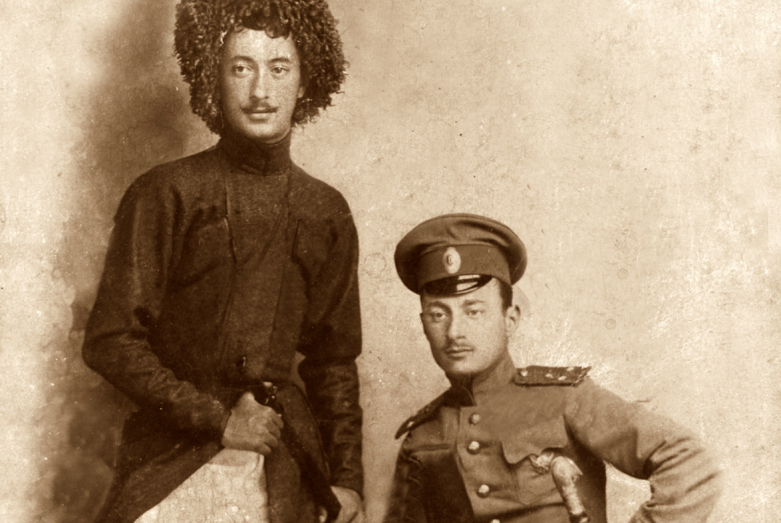
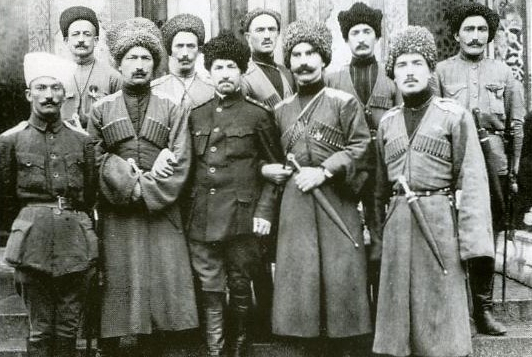
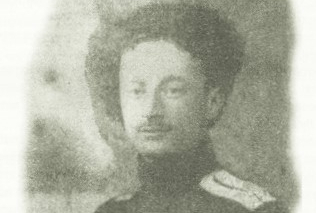
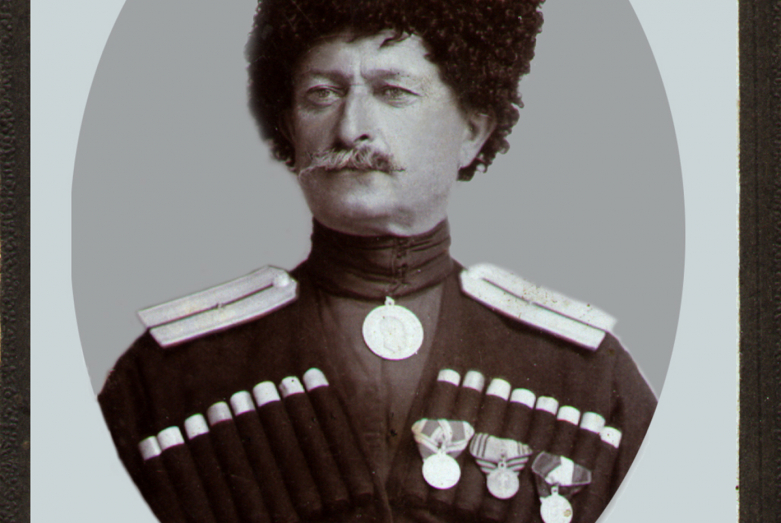
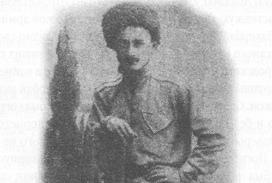
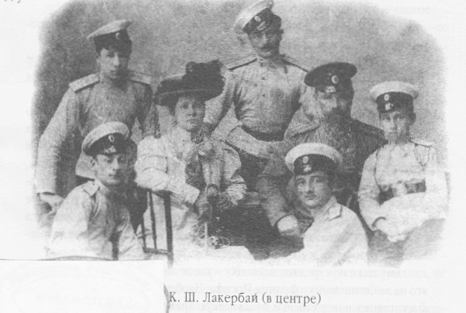
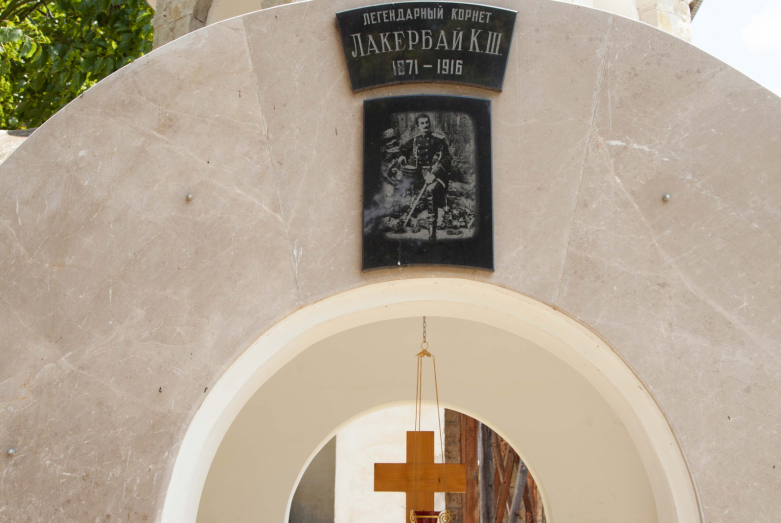
to login or register.